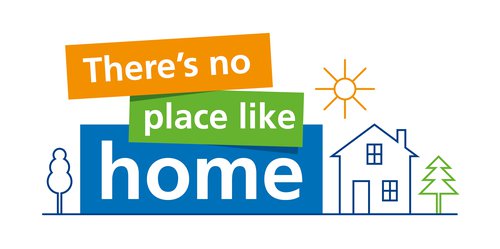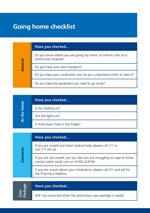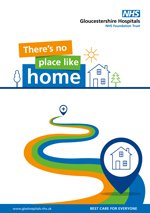There's no place like home
We know that you would rather recover at home than in hospital. That’s why we're working together to make getting you home safely a priority.

It's important to remember that most patients will continue to recover at home once they leave an acute hospital. In fact, many patients need to leave hospital to be able to complete their recovery fully.
Staying in hospital for longer than necessary has a negative impact on how well patients recover. Ensuring that patients are given the chance to continue their lives at home is vital for their long-term wellbeing outcomes. We want to empower patients and their families with the confidence to continue their recovery in a familiar environment.
Sometimes, patients’ families can help us to get them home more quickly, by providing a little support to allow this to happen. You won’t be on your own because there’s a wide range of support available to you.
Why there’s no place like home
The 1000 days campaign highlights that elderly people, the chronically ill, and those with life-limiting conditions are the same people who spend the most time in healthcare settings. These are the very people who have the least time to waste.
When patients have been in hospital for a long time, especially when they are older, they are more likely to experience frailty or impairments to their daily living. Having the right assessment then leaving hospital sooner reduces deconditioning and significantly improves outcomes since 10 days in hospital leads to the equivalent of 10 years ageing in people over 80.
What is deconditioning?
Deconditioning is a decline in function and for older people with frailty, this may start within hours of their lying on a trolley or bed. Up to 65 per cent of older patients experience decline in function during hospitalisation. Many of these patients could prematurely end up in a care home because of ‘deconditioning’ and the loss of functional abilities while in hospital.
Why not acute hospital care?
Acute hospitals are very busy, unfamiliar environments, which can cause confusion and disorientation. This can mean that people get less rest because on many wards, our teams are in and out all through the night, caring for the very unwell. Our services are designed to treat the acute phase of illness or injury, not for recovery and recuperation.
Physical strength
If you stay in bed for long periods, you lose mobility, fitness and muscle strength, which makes it harder for you to regain your independence. Getting up, dressed and moving helps maintain muscle strength and your ability to do things for yourself.
When you’re at home, just doing ordinary day-to-day activities helps to maintain muscle strength, even things like getting up to make a cup of tea. In contrast, when you’re in an unfamiliar environment like a clinical ward, you may be more likely to fall because you don’t have those familiar things around you to steady you if you lose your balance for a moment.
Rest
Good sleep is essential for a long and healthy life but it’s even more important when you're recovering from an injury or illness. Hospitals are busy places with lights, talking and noises from equipment, which can cause sleep deprivation. There’s no bed like your own bed when it comes to getting a good night’s rest.
Mental wellbeing
Being in familiar surroundings with support from your loved ones is one of the best things for mental wellbeing. Hospitals are unfamiliar and can be very confusing which increases your risk of developing delirium (sudden confusion). When you are in hospital for a longer period, you may also lose confidence in your own ability to manage your day-to-day needs. With the right support, many people can return to living their life the way that they want to.
Infection
When you're unwell you're often less resistant to infections. We do everything we can to prevent you from developing an infection but the risk is usually lower at home where there are fewer unwell people under one roof.
Helping people to stay at home
There are a range of support services available to you and your carer (often family, relatives or a friend) after you are discharged from hospital following a stay. These are designed to:
- Help build and regain confidence and independence
- Ensure your home is safe
- Help with everyday tasks including food shopping and collecting prescriptions
- Support to access benefits advice and guidance
- A volunteer visitor providing company at home
- A scheme for carers (often family members, relatives or friends) to ensure that care continues if something untoward happens to a carer
Our commitment: we will
- Put each patient at the centre of decisions, respecting their knowledge and opinions and working alongside them and their families to get the best possible outcome.
- Ensure you and your family receive clear information about your care when they are in hospital, including what will happen on discharge and who to contact if there are any problems.
- Provide simple access to information, advice and services, including support and information to enable self-care and self-management, which helps you to remain as well as you can and stay out of hospital. We will provide a timely and responsive service that meets your needs.
Going home checklist
Before you leave hospital
- Do you know where you are going (to home, to interim care, to a community hospital)
- Do you have your own transport?
- Do you have your medication and do you understand when to take it?
- Do you have the equipment you need to go home?
At the home
- Is the heating on?
- Are the lights on?
- Is there basic food in the fridge?
Concerns
- If you are unwell and need medical help, please call 111 or visit 111.nhs.uk
- If you are not unwell, but you feel you are struggling to cope at home, please contact the Adult Social Care Helpdesk or in an emergency out of hours, call 01452 614194
- If you are unsure about your medication, please call 111 and ask for the Pharmacy Helpline
Useful contacts and numbers
- Age UK Gloucestershire Out of Hospital Team: Supports people aged 65 and over to live independently at home. For more information: Telephone: 01452 420937 or 420928, Mon – Fri 9am – 5pm.
- Age UK Gloucestershire Help Team: if you’re 55 or over and need advice or guidance on something that is affecting you, Age UK’s Help Team can provide support and assistance on a wide range of issues. Email: Helpteam@ageukgloucestershire.org.uk Telephone: 01452 422660
- Gloucestershire Support Scheme: provides practical support to eligible adults and families for food, gas/electricity top ups and household items such as furniture including white goods/appliances and furniture . Visit Gloucestershire Welfare Support Scheme or call 0330-123-5550.
- Gloucestershire Carers Hub (The Carers Emergency Scheme): The scheme can support by ensuring emergency cover is in place if something untoward happens to a carer. For more information visit www.gloucestershirecarershub.co.uk, email carers@peopleplus.co.uk or call 0300 1119000
- Let’s Talk: Can offer help and advice on how to manage your mental health and improve your wellbeing. Visit www.talk2gether.nhs.uk or call 0800 073 2200
- Red Cross: 0117 301 2600 Select Option 2 www.redcross.org.uk
- Gloucestershire County Council Social Care: Adult Social Care Helpdesk 01451 426868 or in an emergency out-of-hours, call 01452 614194
- Community Wellbeing Service - Community wellbeing service also known as ‘social prescribing’, the service is open to anyone over the age of 16, providing one to one support to find out what is important to that person and connecting them to support in their community.
- The Gloucestershire Care and Support Guide: Gloucestershire Care and Support Guide
- Your Circle: YourCircle a directory to help you find your way around care and support and connect with people, places and activities in Gloucestershire
- Gloucestershire Support Hub Support Hub includes links to helpful information and advice and will provide you with the tools you need to save money, look after your mental health and wellbeing and conserve energy.
Resources

Download Going Home Checklist
